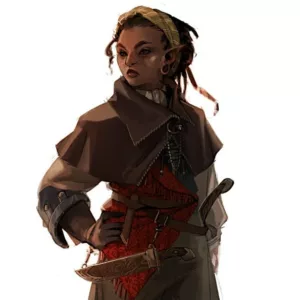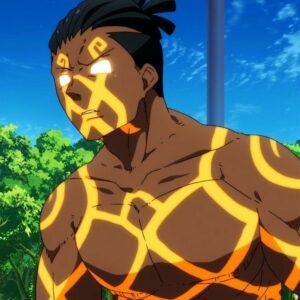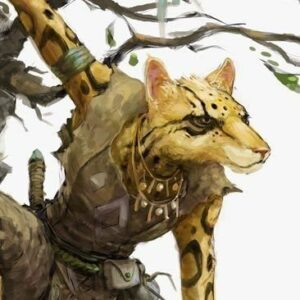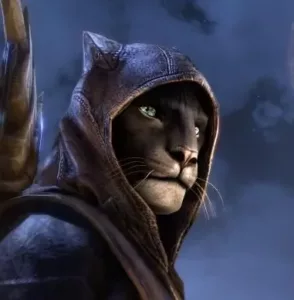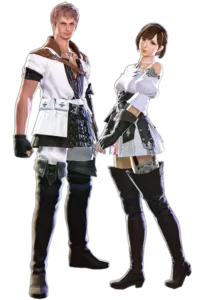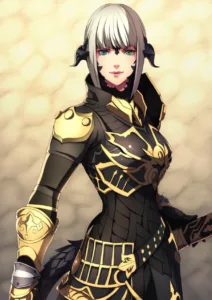
The Ultimate Hack in Creating Barbarian Names
A Barbarian character, in video games and movie portrayals, is a person with brute strength, able to wield huge axes and heavy weapons. They are humans with insurmountable will and overwhelming fortitude that can withstand harsh environments and the heat of battles.
While Barbarians are often described this way, it is also good to know their historical backgrounds and what led authors and game creators to associate them with hardy and vigorous characters today. In this article, you’ll get to know the real-world history of the Barbarians, their culture, and their naming traditions. You’ll get to learn how to create authentic Barbarian names by yourselves and through the aid of Barbarian Name Generators.
Barbarians Throughout History
The term “Barbarian” was formerly used to identify non-local people by the early Greeks. The term came from the Greek word barbaros which means “a babbler”, or a person who speaks unintelligible sounds due to a foreign language. This meaning, however, changed as time passed. It was later on used by the Greeks to brand their enemies with savagery and uncivilized doings. Later in the Bronze Age, the Romans adopted the same word and used it to call all non-Greco-Roman-influenced people “barbarians”.
Romans have the habit of discriminating against other non-Roman cultures as uncivilized or disorganized and force Roman belief and culture into invaded settlements. Scattered Celtic tribes who opposes Roman rule were branded as savage people (barbarians), while those who settled and agreed to Roman rule were given privileges in exchange for tax and resources. This is why the term “barbaric” is now used to describe a savaged and unethical person despite its meaning referencing only to being a blabber.
Barbarian Cultures and Their Naming Traditions
There are four notable Barbarian Cultures that became popular throughout the history of mankind. They are the Germanic Tribes, the Celtic Tribes, the Norse People, and the Huns. While these groups of people were notably branded in general as Barbarians, it is also good to know their real culture and their differences from each other. Additionally, it should not be confused about the co-existence of each of these four cultures because they appeared separately in the world’s timeline. The earliest known barbaric culture is the Celtic tribe.
The Celtic Culture and Naming Convention
The Celtic tribes are the early inhabitants of central and western Europe. They reached their migration peak during the Iron Age and occupied most of modern-day France, the United Kingdom, the Iberian Peninsula, and Germany. Their dominance in the central regions of Europe is weak, primarily due to a lack of common leadership and because of their nomadic lifestyle. They were driven westward by the Romans from the south and the Nordic Germanic people from the north. They are the first group of people to be branded as Barbarians by the Romans during the annexation of Rome in Central Europe.
The Celtic naming convention is straightforward to derive. Their names are a representation of their personality and attitude. They also have gender-neutral names that are often derived from nature and the surrounding environment. Surnames are derived from their ancestors’ names through a patronym. Below are a few examples of Celtic Barbarian names:
- Awen – meaning “wellborn”
- Gethin – meaning “dark”
- O’Doherty – meaning “obtrusive”
- Garvery – “rough” or “nasty”
- Alasdair – “defender”
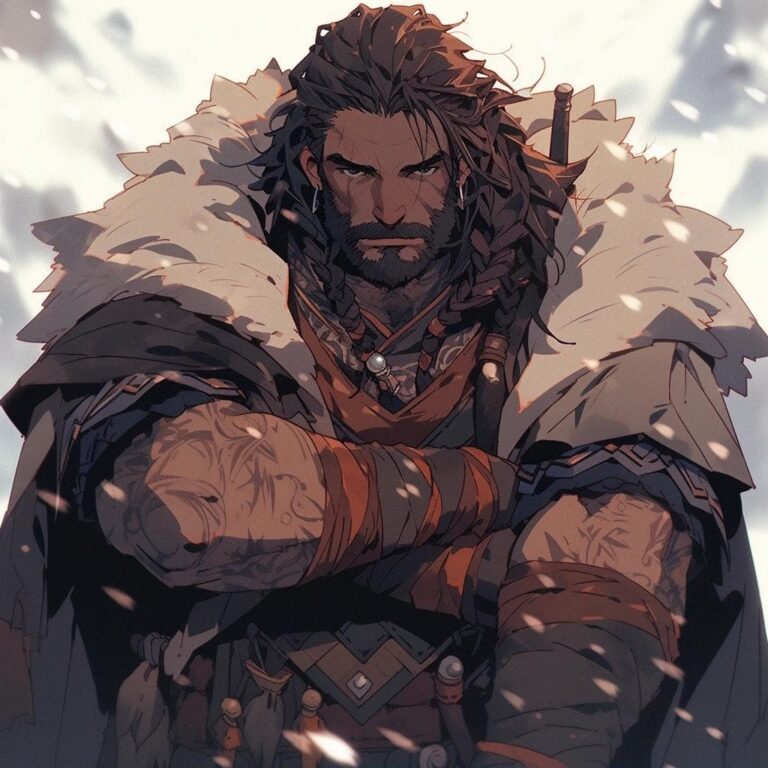
The Germanic and Nordic Culture and Naming Convention
The Germanic tribes started to flourish in the northern and central parts of Europe. Germanic people thriving in the far north of the Scandinavian regions were called Nordic people (North Germanic). Because of the scattered population of the Germanic tribes, they are the reason for the abundance of the Germanic language, being adapted to other languages such as s English, German, Dutch, and Nordic. The Germanic people are among the tribes that the early Romans tried to conquer but seem to limit the interest of the Romans due to certain limitations of the Germanic lands compared to the Celts. Like the Celts, the Romans branded the Germanic people as “barbarians” due to their unusual warfare on bare-foot and violent guerilla ambushes.
The traditional Germanic naming convention is often dithematic or formed from two distinct compositions or topics. For example, the Germanic barbarian name Adalbern is a combination of the elements adal (noble) and bern (bear). Below are more examples of Germanic Barbarian Names:
- Adalwin – adal (noble) + wini (friend)
- Hrorikr – hroor (glory) + gar (spear)
- Ealdrad – eald (old) + raed (council)
- Eoforheard – eofor (boar) + heard (hard)
- Thorfastr – thor (god of thunder) + fastr (firm)
Viking Culture and Naming Convention
The term “Vikings” was derived from the Old Nordic word “vikingr” which means “pirate”. This means that Nordic people who involved themselves in piracy during the medieval ages call themselves “Vikings”. Nordic religions believe that salvation can be earned through death in battle. That is why most of them engage in warfare and acts of violence to accomplish this belief or to show a display of strength. Because of their piracy and violent nature toward other people, they were also branded Barbarians by their victims.
The Nordic people were close cousins to the central European Germanic people. They share the same culture but differ in their way of life due to the cold regions they live in. Similar to the Germanic culture, the Nordic people follow the same dithematic convention. However, there are some differences since the Nordic language became an independent language separate from the original Germanic dialect. Below are some examples of common Viking Barbarian Names:
- Erik – “ruler”
- Ingrid – “Beauty”
- Solveig – sol (sun) + veig (house)
- Gunhild – gun (war) + hild (battle)
- Bjorn – “bear”
The Huns Culture and Naming Convention
Among the three mentioned Barbarian cultures, the Huns are the most recent, existing short-lived between the 4th and the late 5th century AD. The Huns were great horseback riders who pillaged and raided most of Eastern Europe occupied by the Romans. It is said that the Huns were a distant relative of the Xiongnu, the early people of the northern steppes of today’s Russia and Mongolia.
The Huns were branded as Barbarians because of their ruthless treatment of civilians and their savagery during their raids. They believe that their greatest weapon is not their skill in battle, but their instillation of fear among their enemies. They kill men, women, and children, and seldom take prisoners for slavery purposes. The Hunnic rule ended in the Battle of the Catalaunian Plains, when the Romans combined forces with other Barbarian tribes, Gauls and Visigoths, leading to the collapse of their civilization in 459 AD.
The modern-day Hungarian naming convention was solely derived from the old Hunnic language. Their names are based on the Hungarian language and follow the “eastern” naming convention, where surnames are mentioned first before the given name. A few examples of Hunnic Barbarian Names are:
- Csilla – from the Hunnic term csillag or star.
- Reka – based on the name of Atilla the Hun’s wife.
- Zsofia – Hunnic version of the Greek name Sophia
- Orsolya – Hungarian term for “little bear”
- Boglarka – a kind of flower
Common Themes in Barbarian Names
You were able to know the history of the Barbarians and understand the different possible naming conventions from which a Barbarian name may be derived. In this section, we will talk about the commonality or the popular themes that inspire a Barbarian name.
While a Barbarian name is often associated with brutality or savagery, we should also note that they may be other relative ideas that we can relate to it aside from those. The basic theme that we can associate with a barbarian name is Strength and Power.
Strength and Power Themed Barbarian Names
A Barbarian name may show a superior display of power and strength, which radiates a fearful presence on the battlefield. For example, Hilda is a female barbarian name that suggests strength or dominance. It is derived from the Old Nordic term hildr which means “battle”. Below are a few examples of Strength and Power Themed Barbarian names.
- Ragnar – A Viking Barbarian name that means “a warrior”. The best example of a male barbarian name denoting strength and power.
- Ulfar – A Nordic name derived from combining ulf (wolf) and ar (warrior), or a “wolf warrior”. Ferocity is the main idea for this name to display strength and dominance.
- Balamur – A Hunnic-inspired Barbarian name that means “Great Legend”.
- Oebarsius – A Hun Barbarian name inspired by the terms “moon” and “leopard”. This name greatly represents the viciousness of a leopard paired with the strong light of the moon in the dark.
- Aldebrand – An Old Germanic name that means “old sword”. This is a perfect name to denote proficiency or veterans in war.
Barbarian Names with Connection to Nature
Despite being stereotyped as savage and ruthless, Barbarians have a strong affinity to nature. The Celts, for example, are known farmers and owe much of their needs to planting and fishing. They protect their natural resources and pray to the spirits in hopes of connecting with the land. Vikings, on the other hand, also have a deep belief in nature. Their mythology mentioned different “nature” gods such as Jord, the Earth Goddess, and Freyr, the goddess of farming and weather.
You may consider Barbarian names that have relationships and ties with nature, instead of sticking with the traditional Barbarian name. Below are examples of Barbarian Names with a Connection to Nature.
- Brant – meaning “fire” in the Old Germanic Language. The name Brant is also combined with other terms to denote names that are related to fire. Examples are Brandr (torch) and Alebrant (old fire).
- Marit – A female Barbarian name derived from the Old Nordic for the word “pearl” or “sea treasure”.
- Thora – The female equivalent for Thor in the Old Nordic language. Thor means “thunder”.
- Aella – Derived from the Old Germanic language for the term “tempest” or “whirlwind”.
- Hughard – A combination of the Old Germanic word hugu (mind) and hart (hard or brave).
Barbarian Names Based on Family and Lineage
Just like any modern-day names, Barbarian names may also be given based on heritage and family lineage. To put it simply, parents may use existing names in their family to create newer names for their children—or create names based on their royalty, bloodline, or important lineage. Below are a few examples of Barbarian Names based on Family lineage.
- Adalbern – An Old Germanic name derived from the elements adal which mean “noble” and bern which means “bear”. This name is often used for princes or a male child with noble birthright.
- Adallinda – The female version of the name Adalbern. In contrast, this name is a combination of the terms adal (noble) and lind (tender), which is a perfect name for a princess or king’s concubines.
- Eadgifu – This name is derived from the Old Celtic words ead which means “wealth” and giefu which means “gift”. This name can be considered for a wealthy female Barbarian baby.
- Edda – An Old Nordic term used to identify a “great-grandmother”. This name is most often used by female Nordic people in general, however.
Barbarian Names Based Occupation and Role in Society
Lastly, Barbarian names may also be derived from their occupation and role in society. For instance, a soldier may take up names related to warfare or soldiering, while a craftsman or boatmaker may have names related to being an artisan or carpenter. Below are examples of Barbarian Names based on Occupation and their Roles in Society.
- Elshstan – An Old Celtic name which means “temple of stone”. This is an ideal name for an artisan or a carpenter Barbarian baby boy or character. The name also suggests that the person is artistic and creative.
- Ekkebert – This name is perfect for a Barbarian swordsmith. Ekkebert came from the terms ekka which means “blade” and beraht which means “bright”.
- Ciaran – A diminutive term for the name Ciar, this Old Celtic name is perfect for a female Barbarian serving their monastery or temple.
- Rigbarddan – A name directly describing a “bard” or a “poet”.
- Albert – An Old Germanic name for an “absolute ruler”.
Creating Authentic Barbarian Names Using Barbarian Name Generators
Name Generators are a helpful tool that can supplement your search for the perfect Barbarian name. Because of the thousands of readily-available articles to choose from, it might be hard for some people to minimize name their name search. But with the help of a Barbarian Name Generator, users may be able to save time and create more awesome names in just a matter of seconds.
Why Use Barbarian Name Generator?
Name Generators are AI-powered, and can help suggest unique names. It can be found online and are free to use. On top of that, you can use it repeatedly to generate names until you find the one you like. You may also jot down and collect the generated names and use them at your disposal. Lastly, Name Generators strictly follow the naming convention per given category. For example, a Female Barbarian Name Generator will only generate female Barbarian names and will avoid suggesting names outside that scope.
How to Use Name Generators?
In using a Name Generator, you only need to take these three simple steps.
- Choose your category – Name Generators are programmed and created to be particular to a category. For instance, since we are looking for Barbarian names, make sure to search for a Barbarian Name Generator category.
- Select A Gender – Most Name Generators have a built-in selector for male or female or neutral gender. This is a great way for the tool to separate suggested names into male, female, or gender-neutral. Take note that not all Name Generators have this feature. Some may offer to suggest names where genders are mixed.
- Click the “Generate” Button – Once you clicked the button, ready-made names based on your category and gender will flash on your screen. You can continuously generate names until you find the perfect name you want. Take note that the names are randomly generated and there are tendencies to repeat. Also, there are Name Generators that only flash one name at a time.
Barbarian Name Generator Examples
Below are some of the generated names from a Barbarian Name Generator.
Male Barbarian Names Ideas
Ghik | Thorthekr | Retnor | Drawulf | Othoban |
Ell | Fothreinn | Othocar | Jurgen | Welvig |
Herd | Golstikr | Chriszor | Ranmal | Croga |
Jidbalr | Yesnuthrulf | Crudo | Chaskant | Gragron |
Rhaendrak | Driglilfrem | Cragrog | Cryswolf | Fluran |
Female Barbarian Names Ideas
Ghag | Khoh | Rhigrunn | Shamara | Alessia |
Thuh | Trith | Brudlay | Walter | Bellatrix |
Wiy | Sash | Greflag | Teuta | Martia |
Breiymith | Rantunn | Thusligo | Gudrun | Marcheline |
Forthof | Witrus | Bhenhemmi | Sena | Satriya |
Table of Contents



